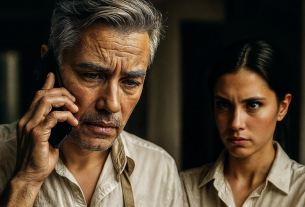Vladimir felt as if the ground itself were springing beneath his feet from happiness. Not from drink—no—from that very pure, bright feeling that had been overflowing him since morning. Today was his day. The day he had waited for two long years, swallowing the dust of army training grounds and rereading to tatters the envelopes with that cherished village address.
It had been two months since he’d come back to his native Ozerki, and now, on this crystal-frosty January day, everything was to reach its apogee. The wedding.
His fiancée, Shurochka—his incomparable Shura—was waiting for him. Every one of her letters had been a priceless treasure. He remembered every line, every scrap of paper that smelled faintly of her perfume. And at the end—always the same: “I await your reply like a nightingale awaits summer.” And the dearest autograph in the world—a print of her lips, scarlet as a drop of dawn, neatly stamped in lipstick. He’d kept those letters in his army kit like a talisman.
A pre-holiday bustle reigned in Volodya’s parents’ house, smelling of pies and wax. In the big front room, swept to a shine, tables stood in an L-shape, covered with brand-new, crackling oilcloth that carried a barely perceptible rubber scent. Along them ran improvised benches: sturdy boards, polished by time, laid across stools and draped with homespun runners patterned with traditional firebirds and roosters. Everything breathed coziness, hard work, and the anticipation of a great celebration.
Here was the groom himself, Vladimir, in a new, slightly tight jacket with a carnation in his lapel, already gathered with his groomsmen. Time to go “buy” the bride. And Shurochka lived close by, diagonally across the road, in the same kind of neat house with carved window frames. The ransom went off loud and merry. The bridesmaids—rosy-cheeked, in festive kerchiefs, with a mischievous spark in their eyes—made him sing, show off his bogatyr strength, and spill out small coins with pillow-mint candies. At last the threshold of the mother-in-law’s parlor was crossed.
The mother-in-law, Anna Stepanovna—a thick-set woman with hands well versed in both work and household—met them with a beaming smile. Blushing, Volodya presented her with the chief mother-in-law gift: a huge, gaudy shawl with long, shimmering silky tassels. She gasped, turned it over in her hands, and at once threw it over her shoulders, enveloping the groom in a hug.
“Sit down, dear son-in-law, sit down, my bright hawks!” she bustled, seating the guests at the table. “Now then, partake of Mother’s treats! I distilled it myself—fiery stuff! Better than any of your city swill!”
And with a proud air she set on the table a carafe of cloudy liquid that immediately sent a pungent fusel aroma drifting through the air.
Shurochka, sitting beside him in a dazzling white dress, looking like the tenderest flower, winced.
“Mama, what are you doing?!” she exclaimed in genuine horror. “Put that stinking stuff away! Look, there’s good vodka and port wine! You’re shaming the guests!”
“What are you wagging your tongue for, daughter?” Anna Stepanovna retorted, not the least abashed. “A wedding runs two days, maybe we’ll catch a third besides—they’ll have time to drink up your vodka and wine! And let them try my moonshine, so they know how strong and hospitable life is here in Ozerki!”
One could not refuse one’s future mother-in-law at such a moment. To the approving rumble of the groomsmen, Vladimir took the first sip. The drink burned his throat, shot up his nose, and its aroma was so saturated and peculiar that it took his breath for a second. But its strength was beyond doubt—“potent stuff!” Volodya approved inwardly, trying not to grimace.
They drank. First—to the bride, to her beauty and faithfulness. Then—to the parents, to their health. Then—to the bright future, to the young couple. With every new shot a warm fire spread through his body, and his head began to spin pleasantly and alarmingly.
Next came the walk to the village council office to register the marriage. The road there remained a blur to Vladimir: he strode along, bellowing at the top of his lungs a fashionable new song that the groomsmen took up: “And the wedding, the wedding sang and danced…” His legs were already getting a bit tangled, but his mood was sky-high. The frosty air seemed to sober him a little, bringing his thoughts back into focus.
At last they were home again, at the main wedding table. Shurochka, eyes sparkling, immediately took control.
“That’s enough for you, my dear,” she said firmly, taking away Volodya’s shot glass. “Now you need to be a handsome, sober groom.”
He didn’t argue. The mother-in-law’s moonshine, which had warmed him at first, now sat inside like a heavy, motionless stake. It made him queasy; a persistent sour-bready aftertaste clung to his mouth, and, to put it mildly, he felt rotten. He sat beaming from ear to ear, tried to eat aspic and cabbage pies, but the food wouldn’t go down.
The guests, not yet fully tipsy, were tucking in energetically, joking, laughing. And then one of the uncles, fired up, banged his fist on the table:
“What are we sitting so quiet for? The newlyweds are right here! Can you do that? Bitter!”
“Bitter! Bitter-r-r!” the chorus of voices took it up, spoons drumming on glasses, demanding the traditional action.
Vladimir and Shurochka rose. She modestly lowered her eyes, covering her face with the veil—a transparent haze through which her happy lips shone. Volodya leaned in to touch them with his own. He could see her lowered lashes, feel her warm breath…
And at that very peak, the long-awaited moment, the mother-in-law’s moonshine—until then dozing deep in his system—suddenly awoke. A mighty, unstoppable wave surged from his stomach to his throat. To halt this swift and utterly uncontrollable natural process of purging the body of the fiery potion was simply impossible!
It happened in an instant. Shame. Horror. A loud, awkward silence taking the place of the shouts of “Bitter!” And then… a general laughter, restrained at first and then swelling. The guests, deciding the groom had just overdone it, took the mishap in stride—these things happen.
But not the bride. Shurochka recoiled, staring at the stains on her dazzling, moments-ago perfect dress. In her eyes was not mere fright but true tragedy, a grief of cosmic proportions. With tears streaming, she bolted from the table and ran into the next room.
Chaos ensued. The two mothers—his and hers—rushed to comfort the sobbing bride, fussing over the ruined dress. It was quickly rinsed in a tub and hung to dry over the hot stove, which immediately began to steam and smell of soap. They urged Shurochka to put on something else, but she was adamant, repeating through sobs: “Only white! A bride must wear only white at her wedding! And it’s… it’s ruined!”
Then the brand-new mother-in-law, Maria Petrovna, slapped her forehead:
“Granny Fyokla! She’s got a dress! From her Marfusha’s wedding—white, guipure lace! It’s there, I know, in the chest!”
Messengers were sent. Soon a dress smelling of mothballs and time was in the house. It really was beautiful—lace, long sleeves, a high collar—but the scent it gave off could bring tears to your eyes. They shook it out in the frost, sprayed it with whatever perfume they had—cheap “Chypre” cologne and “Red Moscow”—and helped Shurochka into this historic attire.
Meanwhile the wedding thundered on. The tipsy guests, swept up by Uncle Ivan’s accordion and Tamara, the born rabble-rouser, hardly noticed the bride’s absence, and when she returned they only hummed approvingly: “Oh, how lovely!” No one even thought the dress was different. The dance struck up, the ditties flowed.
After a while, when everyone sat down again, some particularly unrestrained guest, now good and drunk, bellowed once more: “What are we so quiet for? It’s bitter! Bitter-r-r!”
At that fateful word, Vladimir went pale. Everything inside him began to whirl again; the familiar horror seized his body. He tried to master himself, but it was no use. The second attempt to kiss his beloved Shurochka ended in the same woeful, absolutely identical result.
This time the bride’s hysterics were real and deafening. Sobbing, she tore off the second dress—now also ruined—and locked herself in the front room, refusing to come out to the guests. It seemed the wedding was over. Happiness smashed to smithereens.
Fortunately, by then her own first dress had already dried above the stove. With the efforts of the two mothers and her friends—with coaxing, tears, and promises—they finally persuaded Shurochka to change and return. While she was dressing, the toastmaster, a worldly fellow, took the floor and strictly instructed the guests: “Dear guests! Our groom is allergic to the word ‘bitter’! We don’t say it anymore! Instead we shout ‘Sweet!’ and kiss our other halves!”
And lo and behold! After that… everything was fine. Because it simply couldn’t get any worse. The guests ate and drank, sang and made merry with all their hearts the whole first day, the whole second, and the hardiest—the true connoisseurs of the feast—tacked on a third besides.
And Vladimir and Shurochka… They lived a long life in love and harmony. They raised three children, and those children gave them seven grandchildren, who now fill their house with peals of laughter. They still live in those same Ozerki, only now in a new, spacious home, and in two years they’re sure they’ll celebrate their golden wedding anniversary.
Only Vladimir Alexandrovich has already begun gently hinting to the future organizers:
“Do make sure to warn the guests in advance… so that ‘bitter’… you know… no one shouts it. Just in case… The story, you understand, might repeat itself.”
Because through their own experience they learned a simple and great truth: it doesn’t matter how your wedding went, or how many dresses the groom ruined. Your happiness doesn’t depend on that. It depends on whether you find that one person who, seeing you at your most ridiculous and awful, won’t run away but will stay with you—and will “await your reply like a nightingale awaits summer.”



